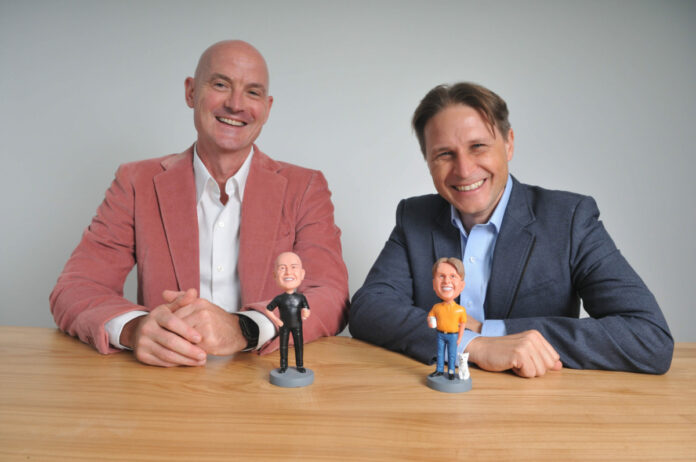Strategic consultation company DeciBio is leaning on the power of data to handle the increasing entry fees needed by companies to compete in a precision medicine space dominated by deep-pocketed organizations.
With four proprietary insight databases and two market platforms included in its offerings, the Century City-based company sees data as the way to attract and retain startup clients that range from mid- to large-scale diagnostic and life science tools companies to pharmaceutical and digital health organizations.

“The idea over the last nine years has been to try to find ways to interact with as many of the key stakeholders in precision medicine (as possible),” said David Cavanaugh, DeciBio’s vice president. “We want to be at the center of this multi-dimensional hub of precision medicine.”
The company’s insight databases include MarketBook and DxBooks.
MarketBook is a predictive data model that tracks, segments and forecasts revenues of more than 100 life science research tools companies, including ThermoFisher and Bio-Rad Laboratories.
DeciBio refers to the research tools market as one that produces instruments, reagents and other technologies that are acquired as part of medical research, as opposed to tools being used for patients.
“The idea (with MarketBook) is to have this very granular view of this market and do it in a holistic way, so clients understand all the moving parts,” Cavanaugh said.
Meanwhile, the DxBooks database provides information on domestic labs’ testing behaviors in the areas of oncology biomarkers, infectious disease diagnostics and Covid-19 testing.
DeciBio has built DxBooks via surveys of hospital labs to see what tests are being conducted and which instruments are being used to conduct those tests. For instance, oncology biomarker testing information is derived from around 300 hospital and reference labs annually throughout the United States.
The data produced allows clients using DxBooks to better understand the evolving market share of medical instruments.
Funding
These database services are offered to clients through subscription models, the cost of which DeciBio did not disclose. Other database services include I/O BioMap and TheraTrack.
“We know that our clients get frustrated when they work with other service providers in which they end up having to educate (the service providers) on the market. For us, we’ve always had this deep understanding of the size of the markets, growth rates and market shares,” Cavanaugh said. “All this information makes it much easier to actually focus on why clients come to us typically, which is to solve a business problem.”
In the cases of smaller companies seeking to use DeciBio’s consulting or data services, DeciBio finds alternative forms of payment, according to Stephane Budel, the company’s founding partner.
“We’re willing to share the risk that comes with launching a product and essentially take equity or debt as a form of payment for some of these small companies, so that enables us to work throughout the entire set of companies that constitute that space,” Budel said.
He added that DeciBio finds ways to work with smaller companies either through the company’s venture capital arm or the data arm, where it can offer products at a more affordable price point. DeciBio launched its venture capital and creation firm, DeciBio Ventures, last December.
DeciBio Ventures focuses its investments on startups in the tools and therapeutics markets. In a press release, the venture capital firm said portfolio companies would be able to leverage DeciBio Analytics’ products, solutions, and services to gain market-level insights.
In July, DeciBio Ventures participated in a seed-funding round for genomic medicine technology developer Replay that totaled $55 million. KKR & Co. and OMX Ventures led the funding round.
Ahmed Enany, chief executive of the Southern California Biomedical Council in Los Angeles, said that although an abundance of active life-science consulting firms, the interesting thing about DeciBio is its venture capital arm.
“It helps them attract clients who may be interested in tapping their venture fund for early-stage funding,” Enany said. “This is an emerging trend among consultancy firms that end up creating investment arms to take advantage of hyper-growth opportunities.”
Startup strategy
Cavanaugh said that at its core, DeciBio has been focused on data and consulting services and that the investment arm was created because of the company’s interest in getting further involved with startups.
“It’s interesting because we are a strategy consulting firm ourselves, so it’s quite important to figure out what you want to focus on,” Budel said. “What is it that you want to do and not do? Finding the balance between that (is important).”
According to Cavanaugh, DeciBio is expanding its venture capital presence and is also in the process of raising funds with a partner to invest in startup companies.
Cavanaugh said DeciBio, though a small firm, has tried to emulate large firms that have dedicated teams of scientists in place for the development and maintenance of data solutions.
He added that the data solutions and platforms offered by DeciBio are significant investments for the company.
“It means taking money that we make on, say, the consulting side, and reinvesting that into data products that can take a year or two before you actually see them bear fruit and revenue,” Cavanaugh said. “An example is the expert network we’re building, and we’ve been working on that for a number of years.”
The network referred to by Cavanaugh is called Dexter, a platform that allows clients to connect with the company’s network of life science advisors via interviews or surveys that produce insights designed to assess the market’s appetite for a service or product or help with the launch of a project.
Dexter follows a pay-as-you-go pricing model and has no onboarding fees or annual contracts.
“We’re bringing that to people at a very small scale,” Cavanaugh said. “Someone can come and say, ‘I want to talk to 10 of the world’s leading oncologists involved in early detection in cancer,’ and we can help them do that.”
Cavanaugh said the network gives clients the option between six-figure consultation projects or a significantly cheaper platform like Dexter to gain insights.
The company also produces and sells market reports that can be purchased with individual user, site or global licenses. An individual user license for the company’s oncology biomarker market assessment costs a one-time fee of $5,300.

